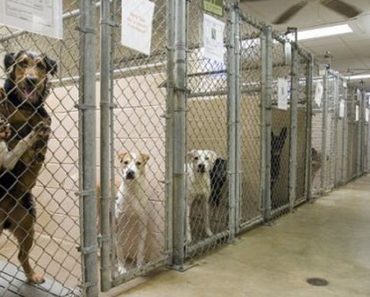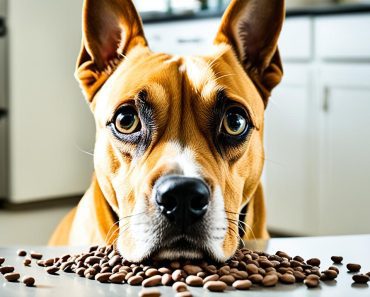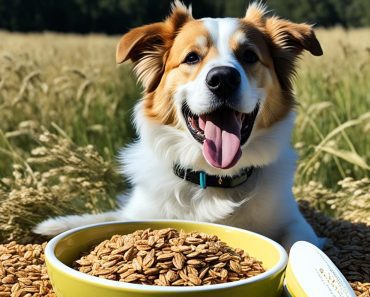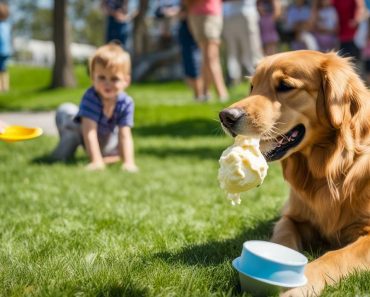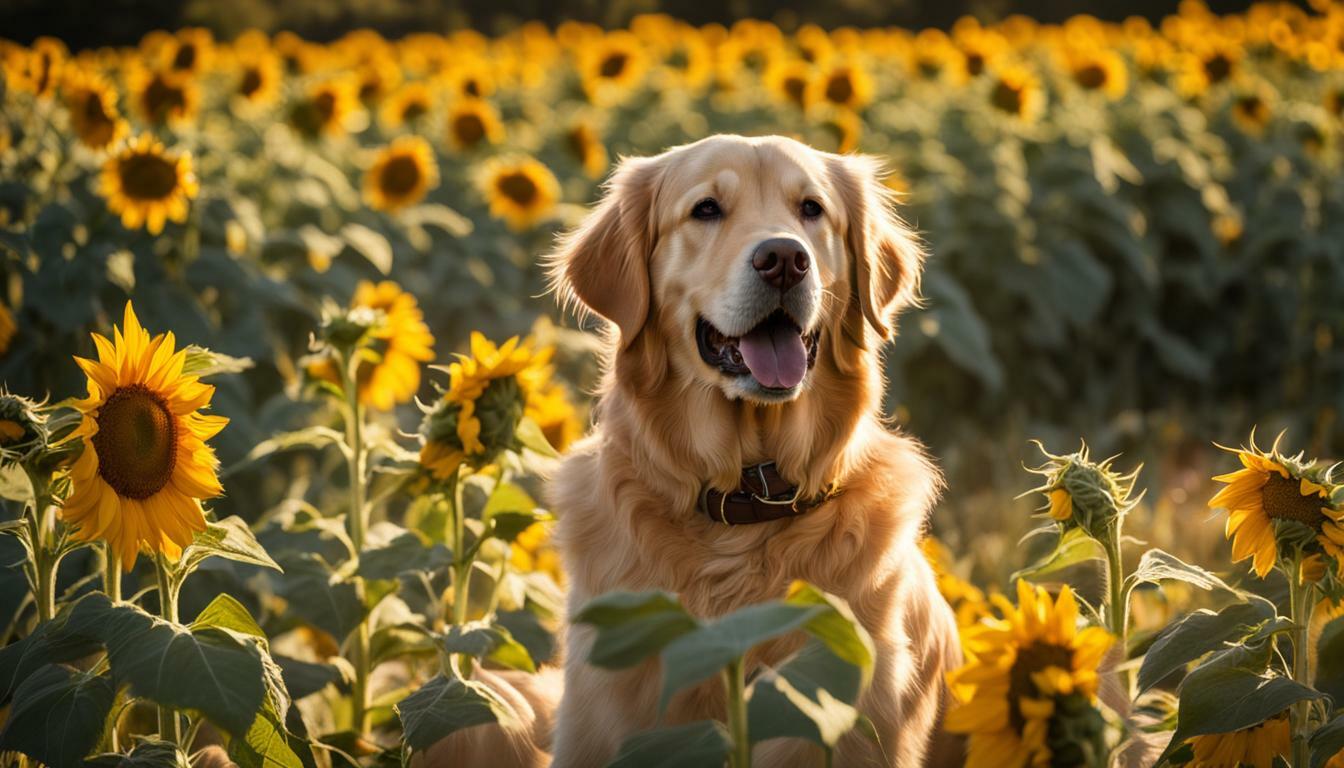
If you’ve ever wondered whether it’s safe for your furry friend to snack on sunflower seeds, you’ve come to the right place. Dogs can eat sunflower seeds in moderation, but there are a few things to consider.
Sunflower seeds are safe and nutritious for dogs as they are high in vitamins and minerals like vitamin E, manganese, copper, and selenium. They are also a good source of linoleic acid, which is important for healthy skin and coat.
However, it is crucial to peel the shells of sunflower seeds before feeding them to dogs. The shells can cause digestive issues and potentially lead to blockage or obstruction. In addition, dogs should not be given salted or flavored sunflower seeds, as excessive sodium levels can cause health problems.
It is important to feed sunflower seeds to dogs in moderation and as part of a balanced diet. By incorporating sunflower seeds into your dog’s diet safely, you can promote their overall health and well-being.
Key Takeaways:
- Sunflower seeds are safe and nutritious for dogs in moderation.
- They are high in vitamins, minerals, and linoleic acid.
- Always remove the shells before feeding them to dogs to avoid digestive issues.
- Avoid giving dogs salted or flavored sunflower seeds due to their high sodium content.
- Feed sunflower seeds to dogs as part of a balanced diet.
Are Sunflower Seeds Safe for Dogs?
Before introducing sunflower seeds into your dog’s diet, it’s important to understand if they are safe for canine consumption. Dogs can eat sunflower seeds in moderation, but there are a few things to consider.
Sunflower seeds themselves are safe and can provide various nutritional benefits to dogs. They are high in vitamins and minerals like vitamin E, manganese, copper, and selenium. These nutrients are essential for a dog’s overall health and contribute to a shiny coat and healthy skin. Sunflower seeds are also a good source of linoleic acid, which plays a vital role in maintaining optimal skin and coat condition.
However, it is crucial to remember that dogs should not consume the shells of sunflower seeds. The shells can be difficult for dogs to digest and may potentially lead to blockages or obstructions in their digestive system. To avoid any potential issues, always remove the shells before feeding sunflower seeds to your furry friend.
Another important consideration is to avoid salted or flavored sunflower seeds. Excessive sodium levels can be harmful to dogs and may cause health problems, such as increased thirst or even sodium toxicity. It’s best to stick to plain, unsalted sunflower seeds when sharing them with your dog.
Overall, sunflower seeds can be a healthy addition to your dog’s diet when given in moderation. They offer nutritional benefits and can be a tasty treat for your furry companion. Just remember to remove the shells and choose plain, unsalted seeds to keep your dog safe and healthy.
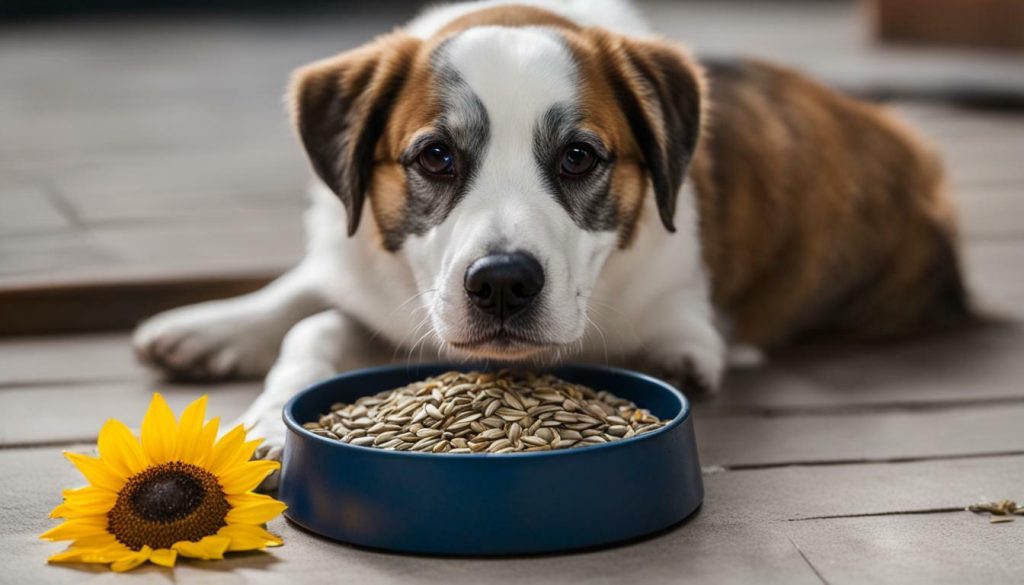
Nutritional Benefits of Sunflower Seeds for Dogs
Sunflower seeds pack a nutritional punch and provide several health benefits for our furry companions. These small seeds are rich in vitamins and minerals, making them a great addition to a dog’s diet.
One of the key nutrients found in sunflower seeds is vitamin E. This powerful antioxidant helps support your dog’s immune system and can protect against cell damage. Additionally, sunflower seeds are high in minerals like manganese, copper, and selenium, which are essential for various bodily functions.
Another important component of sunflower seeds is linoleic acid, an omega-6 fatty acid that plays a vital role in maintaining healthy skin and a shiny coat. Including sunflower seeds in your dog’s diet can help promote a lustrous coat and reduce any dryness or itching.
| Nutrient | Amount per 100g |
|---|---|
| Vitamin E | 35.17mg |
| Manganese | 1.95mg |
| Copper | 1.8mg |
| Selenium | 53μg |
“Incorporating sunflower seeds into your dog’s diet can provide essential nutrients that contribute to their overall well-being.” – Dr. Sarah Johnson, Veterinarian
When introducing sunflower seeds to your dog’s diet, it is important to start with small amounts to ensure they tolerate them well. You can sprinkle a few seeds on top of their regular food or offer them as a treat. Remember to remove the shells before feeding them to your pup, as the shells can be difficult to digest and may pose a choking hazard.
As with any addition to your dog’s diet, moderation is key. Sunflower seeds should be given as part of a balanced and varied diet, alongside other nutritious foods. If you have any concerns about your dog’s diet or if they have any underlying health conditions, it is always best to consult with your veterinarian before making any changes.

By incorporating sunflower seeds into your dog’s diet, you can provide them with a tasty and nutritious snack that supports their overall health and well-being. Just remember to keep it in moderation and always prioritize their safety and well-being.
The Importance of Moderation
While sunflower seeds can be a healthy addition to your dog’s diet, moderation is key to ensure their overall well-being. Sunflower seeds are rich in vitamins and minerals that can provide numerous benefits, such as promoting healthy skin and coat, supporting immune function, and aiding in proper growth and development.
When incorporating sunflower seeds into your dog’s diet, it’s important to remember that they should be given as a treat or a supplement rather than a staple food. Too many sunflower seeds can lead to weight gain, as they are high in fat and calories. As a general guideline, it is recommended to feed your dog no more than a small handful of sunflower seeds per day, depending on their size and activity level.
Additionally, it is crucial to peel the shells of sunflower seeds before giving them to your dog. The shells can be difficult for dogs to digest and may cause gastrointestinal issues such as stomach upset, vomiting, or diarrhea. To ensure your dog’s safety, always remove the shells and only offer them the inner seed.
Remember, every dog is unique, and what works for one may not work for another. It’s essential to monitor your dog’s response to sunflower seeds and adjust their portion size accordingly. If you notice any adverse reactions or digestive problems, it may be best to discontinue feeding sunflower seeds and consult with your veterinarian for further guidance.
Removing the Shells
When it comes to sharing sunflower seeds with your pup, it’s crucial to remove the shells to avoid any potential digestive problems. While the inner kernels of sunflower seeds are safe for dogs to consume, the tough outer shells can pose a risk to their digestive system. Dogs have a harder time breaking down and digesting these shells, which can lead to gastrointestinal issues such as upset stomach, vomiting, or even blockage. To ensure your furry friend can safely enjoy some sunflower seeds, take the time to remove the shells before offering them as a treat.
Removing the shells from sunflower seeds is a simple process that can be done by hand. Start by cracking open the shell gently, being careful not to crush the kernel inside. Once the shell is split, you can easily remove it and discard it. Alternatively, you can purchase shelled sunflower seeds to save time and effort. These are readily available in pet stores or online, and they are a convenient option if you plan to incorporate sunflower seeds into your dog’s diet regularly.
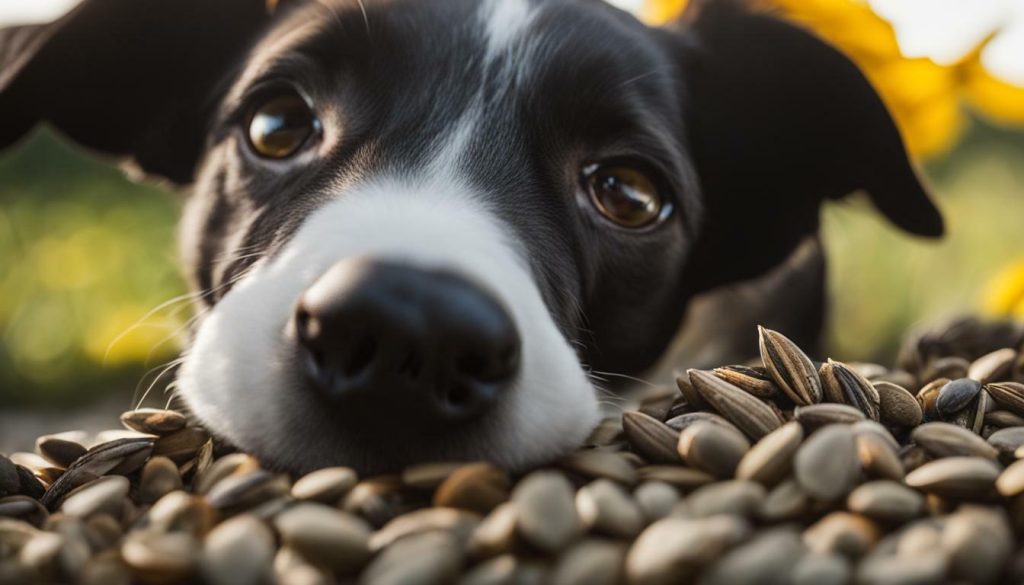
By removing the shells from sunflower seeds, you can ensure that your dog can safely enjoy the nutritional benefits these seeds offer without any risk to their digestive system. Remember to feed sunflower seeds to your furry friend in moderation and as part of a balanced diet to maintain their overall health and well-being.
Avoiding Salted or Flavored Seeds
While you might enjoy salted or flavored sunflower seeds, it’s best to steer clear of these options when it comes to treating your furry friend. Dogs have a much lower tolerance for sodium than humans do, and excessive salt intake can lead to serious health problems, including dehydration, electrolyte imbalance, and even kidney damage. So, it’s important to be mindful of the types of sunflower seeds you offer to your beloved canine companion.
Instead, opt for plain, unsalted, and unflavored sunflower seeds when sharing them with your dog. Not only will this help to prevent any potential health issues, but it also allows your pet to enjoy the natural taste and nutritional benefits of these nutritious seeds.
To ensure that your dog is getting the safest and healthiest snack possible, take the time to carefully read the packaging labels and ingredients list before purchasing sunflower seeds. Avoid any products that contain added salt, flavorings, or other additives that could be harmful to your pet’s well-being.
Remember, it’s always best to consult with your veterinarian before introducing any new foods, including sunflower seeds, into your dog’s diet. They can provide personalized advice based on your dog’s specific needs and help you establish a balanced and nutritious feeding plan.
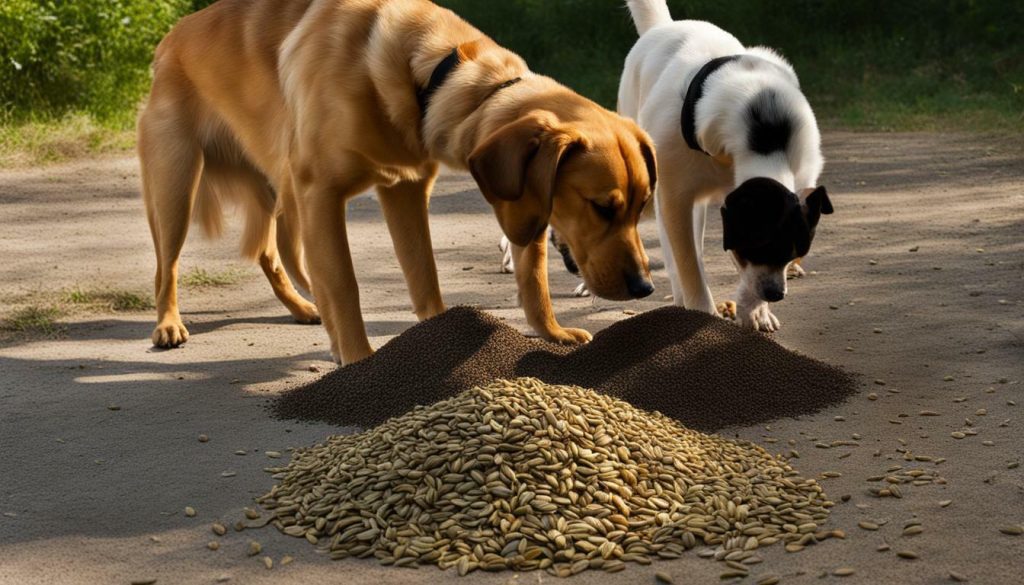
| Benefits of Avoiding Salted or Flavored Seeds: |
|---|
| Prevents excessive sodium intake and associated health problems |
| Reduces the risk of dehydration and electrolyte imbalance |
| Promotes a natural and healthy diet for your dog |
Incorporating Sunflower Seeds into Your Dog’s Diet
Now that you know the ins and outs of sunflower seeds and dogs, let’s discuss how you can include this nutritious snack into your pup’s diet. Sunflower seeds can be a great addition to your dog’s meals, but it’s essential to follow some guidelines to ensure their safety and health.
1. Start with Small Quantities: When introducing sunflower seeds to your dog’s diet, start with small quantities to see how they react. Monitor their digestion and watch for any signs of discomfort or allergies.
2. Mix with Regular Meals: Instead of feeding sunflower seeds as a standalone treat, consider mixing them with your dog’s regular meals. You can sprinkle a small amount of crushed or ground sunflower seeds on top of their food to add a tasty and nutritious boost.
3. Use as a Training Reward: Sunflower seeds can also be used as a training reward for your dog. Keep a small container of shelled and unsalted sunflower seeds handy during training sessions to reward good behavior. This can help create a positive association with sunflower seeds and reinforce training commands.
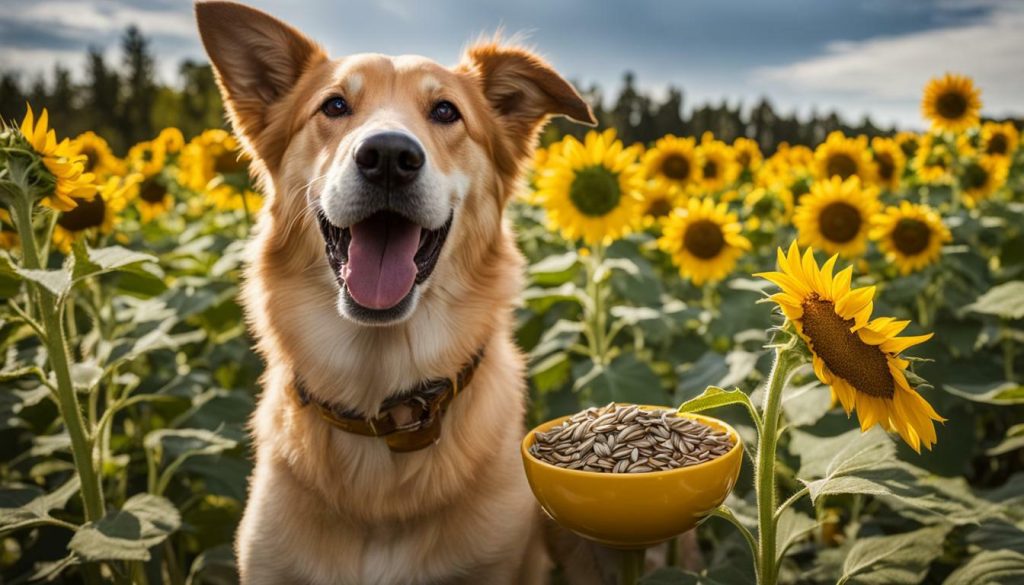
Tips for Choosing and Preparing Sunflower Seeds for Dogs
When selecting sunflower seeds for your dog, opt for raw, unsalted, and unflavored varieties. Avoid seeds with added seasonings, as they may contain ingredients that are harmful to dogs, such as excessive salt or artificial flavorings.
Before feeding sunflower seeds to your dog, it’s crucial to remove the shells. While the shells are not toxic, they can cause digestive issues and potentially lead to blockage or obstruction in your dog’s digestive system.
To peel the shells, you can either purchase shelled sunflower seeds or follow these steps:
- Place the sunflower seeds in a plastic bag.
- Use a rolling pin or a heavy object to gently crush the seeds, breaking the shells.
- Separate the shells from the seeds by sifting through the crushed mixture.
- Discard the shells and keep the peeled sunflower seeds for your dog.
Remember, moderation is key when it comes to feeding sunflower seeds to your dog. While they offer various health benefits, too much of a good thing can cause imbalances in their diet. Consult with your veterinarian to determine the appropriate amount of sunflower seeds to incorporate into your dog’s specific dietary needs.
With proper preparation and moderation, sunflower seeds can be a delightful and nutritious addition to your dog’s diet. Enjoy exploring different ways to incorporate this wholesome snack into their meals, and watch your furry friend reap the benefits of this natural gift from the sun.
Conclusion
When it comes to sharing sunflower seeds with your furry companion, remember to do so in moderation and ensure that the seeds are safely prepared to promote their well-being.
Dogs can eat sunflower seeds, but there are a few important factors to consider. Sunflower seeds are safe and nutritious for dogs as they are packed with vitamins and minerals like vitamin E, manganese, copper, and selenium. These nutrients contribute to their overall health and well-being. Additionally, sunflower seeds contain linoleic acid, which is crucial for maintaining a healthy skin and coat.
However, it is crucial to remove the shells of sunflower seeds before offering them to your dog. The shells can cause digestive issues and potentially lead to blockage or obstruction in their digestive system. To prevent any health complications, always ensure that the seeds are free of shells before sharing them with your furry friend.
Moreover, it is important to avoid giving your dog salted or flavored sunflower seeds. These varieties often contain high levels of sodium, which can be harmful to your dog’s health if consumed excessively. Stick to plain, unsalted sunflower seeds to ensure the well-being of your furry companion.
Incorporating sunflower seeds into your dog’s diet can be a beneficial addition, but remember to do so in moderation and as part of a balanced diet. Consult with your veterinarian to determine the appropriate amount of sunflower seeds for your dog based on their specific needs and dietary requirements. By following these guidelines, you can provide your furry friend with the nutritional benefits of sunflower seeds while keeping them safe and healthy.
FAQ
Can dogs safely eat sunflower seeds?
Yes, dogs can eat sunflower seeds in moderation. However, there are a few things to consider.
Are sunflower seeds safe for dogs?
Sunflower seeds are generally safe for dogs, but there are risks involved if not prepared properly.
What are the nutritional benefits of sunflower seeds for dogs?
Sunflower seeds are high in vitamins and minerals that can benefit dogs, such as vitamin E and manganese.
Why is moderation important when feeding sunflower seeds to dogs?
Feeding sunflower seeds in moderation is essential to ensure a balanced diet for dogs.
Should the shells of sunflower seeds be removed before feeding them to dogs?
Yes, it is important to remove the shells of sunflower seeds before feeding them to dogs to avoid digestive issues.
Can dogs have salted or flavored sunflower seeds?
No, dogs should not be given salted or flavored sunflower seeds due to the high sodium content.
How can sunflower seeds be incorporated into a dog’s diet?
Sunflower seeds can be added to a dog’s diet in moderation and as part of a balanced meal plan.
Can you provide a summary of the key points regarding dogs and sunflower seeds?
Dogs can eat sunflower seeds, but they should be fed in moderation, without the shells, and unsalted or unflavored.



